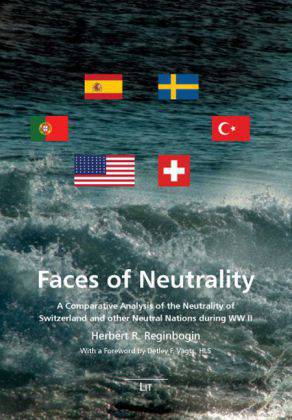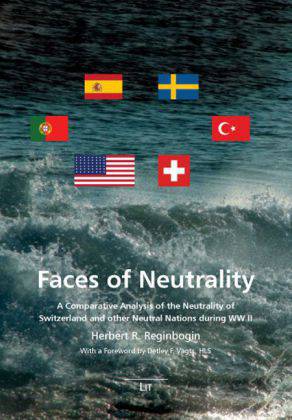
Je cadeautjes zeker op tijd in huis hebben voor de feestdagen? Kom langs in onze winkels en vind het perfecte geschenk!
- Afhalen na 1 uur in een winkel met voorraad
- Gratis thuislevering in België vanaf € 30
- Ruim aanbod met 7 miljoen producten
Je cadeautjes zeker op tijd in huis hebben voor de feestdagen? Kom langs in onze winkels en vind het perfecte geschenk!
- Afhalen na 1 uur in een winkel met voorraad
- Gratis thuislevering in België vanaf € 30
- Ruim aanbod met 7 miljoen producten
Zoeken
Faces of Neutrality
A Comparative Analysis of the Neutrality of Switzerland and other Neutral Nations during WW II. With a Foreword by Detlev F. Vagts, HLS
Herbert R Reginbogin
€ 24,95
+ 49 punten
Omschrijving
"Herbert Reginbogin's important book fills a historical gap, and acts as a valuable corrective in the general treatment of Switzerland's role during the Second World War. In addressing all of the moral and historical charges laid at Switzerland's door in relation to Nazi Germany, it does not offer an apology but, far more valuably, provides a sustained, nuanced analysis of the issues at stake. It is a work of contextualization and comparison that seeks to understand."
Donald Bloxham, University of Edinburgh, Scotland, Professor of Modern History, Philip Leverhulme Prize in 2006
"Contending that Swiss neutrality during the Second World War has not only been misunderstood, but has also been unfairly stigmatized, Herbert Reginbogin's learned and wide-ranging assessment offers a much-needed corrective to received wisdom on the subject. Commendably, he presents a comparative assessment, comparing the Swiss both to European neutrals, and to the United States - which, it is often forgotten, defended the posture of neutrality for the first two years of the war. Reginbogin's study highlights the need for careful assessment in the context of more than half a century ago. Seen in those terms, the behavior of the Swiss emerges far more nuanced, more driven by the desperate conditions of total war, and far less susceptible to present-day moralizations than in the work of many writers. This is an important contribution, which deepens our understanding of the Second World War."
Michael R. Marrus, University of Toronto, Chancellor, Rose and Ray Wolfe Professor Emeritus of Holocaust Studies
"Herbert Reginbogin brings a slightly different picture of Swiss neutrality during World War II to life, pointing at the political necessity of a small country surrounded by enemy forces to compromise. In comparing the Swiss policy towards the Nazi regime to that of other neutral states and to the USA he argues that the Swiss managed to uphold its credibility. A truly valuable contribution to the concept of neutrality in international law and politics."
Christoph Safferling, University of Marburg, Germany, Professor of International Criminal Law, Director International Research and Documentation Center for War Crimes Trials
Donald Bloxham, University of Edinburgh, Scotland, Professor of Modern History, Philip Leverhulme Prize in 2006
"Contending that Swiss neutrality during the Second World War has not only been misunderstood, but has also been unfairly stigmatized, Herbert Reginbogin's learned and wide-ranging assessment offers a much-needed corrective to received wisdom on the subject. Commendably, he presents a comparative assessment, comparing the Swiss both to European neutrals, and to the United States - which, it is often forgotten, defended the posture of neutrality for the first two years of the war. Reginbogin's study highlights the need for careful assessment in the context of more than half a century ago. Seen in those terms, the behavior of the Swiss emerges far more nuanced, more driven by the desperate conditions of total war, and far less susceptible to present-day moralizations than in the work of many writers. This is an important contribution, which deepens our understanding of the Second World War."
Michael R. Marrus, University of Toronto, Chancellor, Rose and Ray Wolfe Professor Emeritus of Holocaust Studies
"Herbert Reginbogin brings a slightly different picture of Swiss neutrality during World War II to life, pointing at the political necessity of a small country surrounded by enemy forces to compromise. In comparing the Swiss policy towards the Nazi regime to that of other neutral states and to the USA he argues that the Swiss managed to uphold its credibility. A truly valuable contribution to the concept of neutrality in international law and politics."
Christoph Safferling, University of Marburg, Germany, Professor of International Criminal Law, Director International Research and Documentation Center for War Crimes Trials
Specificaties
Betrokkenen
- Auteur(s):
- Uitgeverij:
Inhoud
- Aantal bladzijden:
- 240
- Taal:
- Engels
- Reeks:
- Reeksnummer:
- nr. 31
Eigenschappen
- Productcode (EAN):
- 9783825819149
- Uitvoering:
- Paperback
- Afmetingen:
- 162 mm x 235 mm
- Gewicht:
- 570 g

Alleen bij Standaard Boekhandel
+ 49 punten op je klantenkaart van Standaard Boekhandel
Beoordelingen
We publiceren alleen reviews die voldoen aan de voorwaarden voor reviews. Bekijk onze voorwaarden voor reviews.









